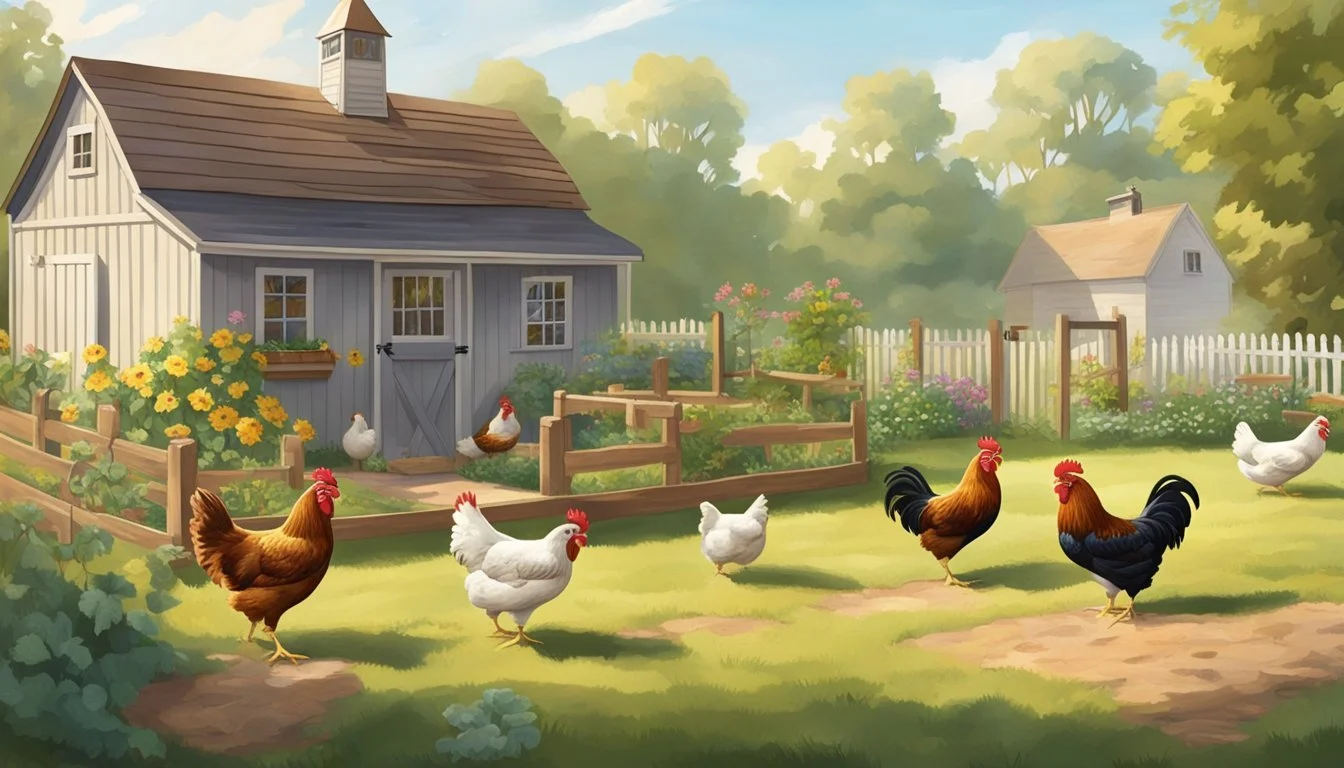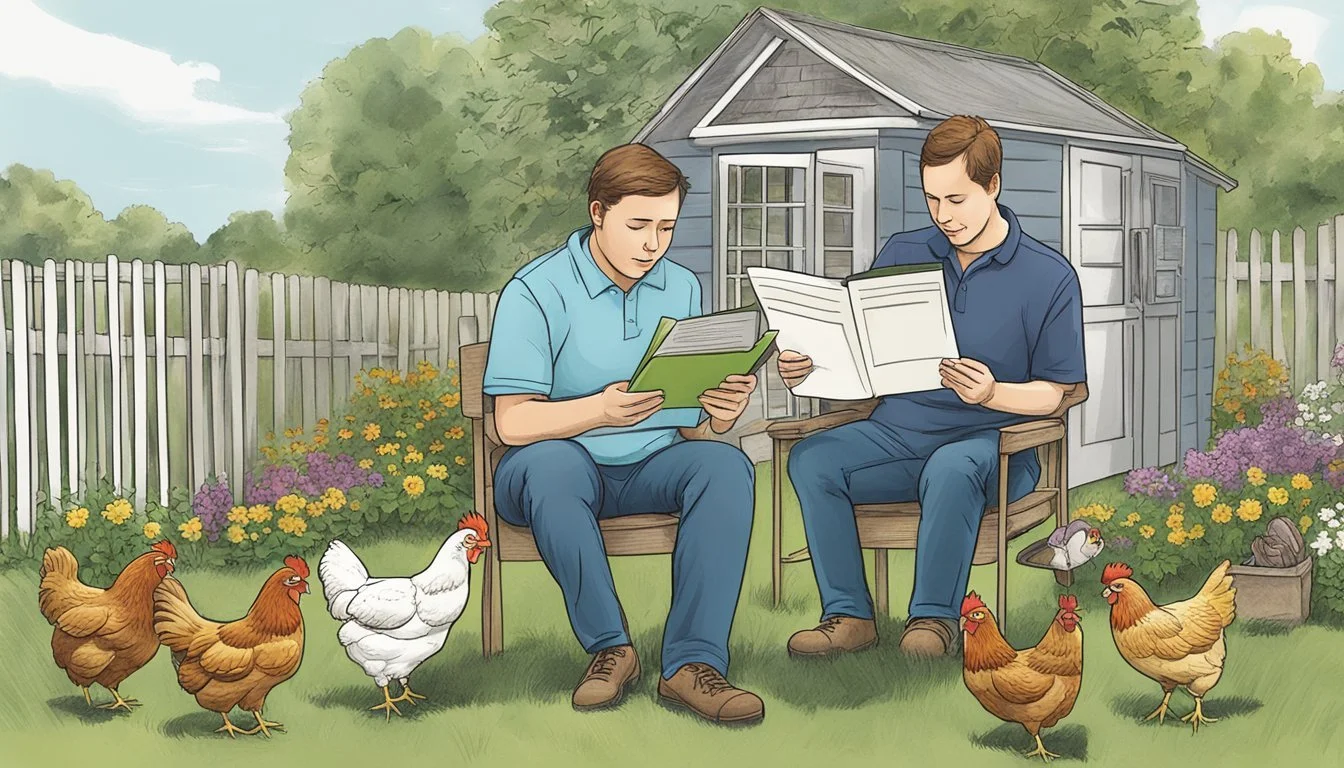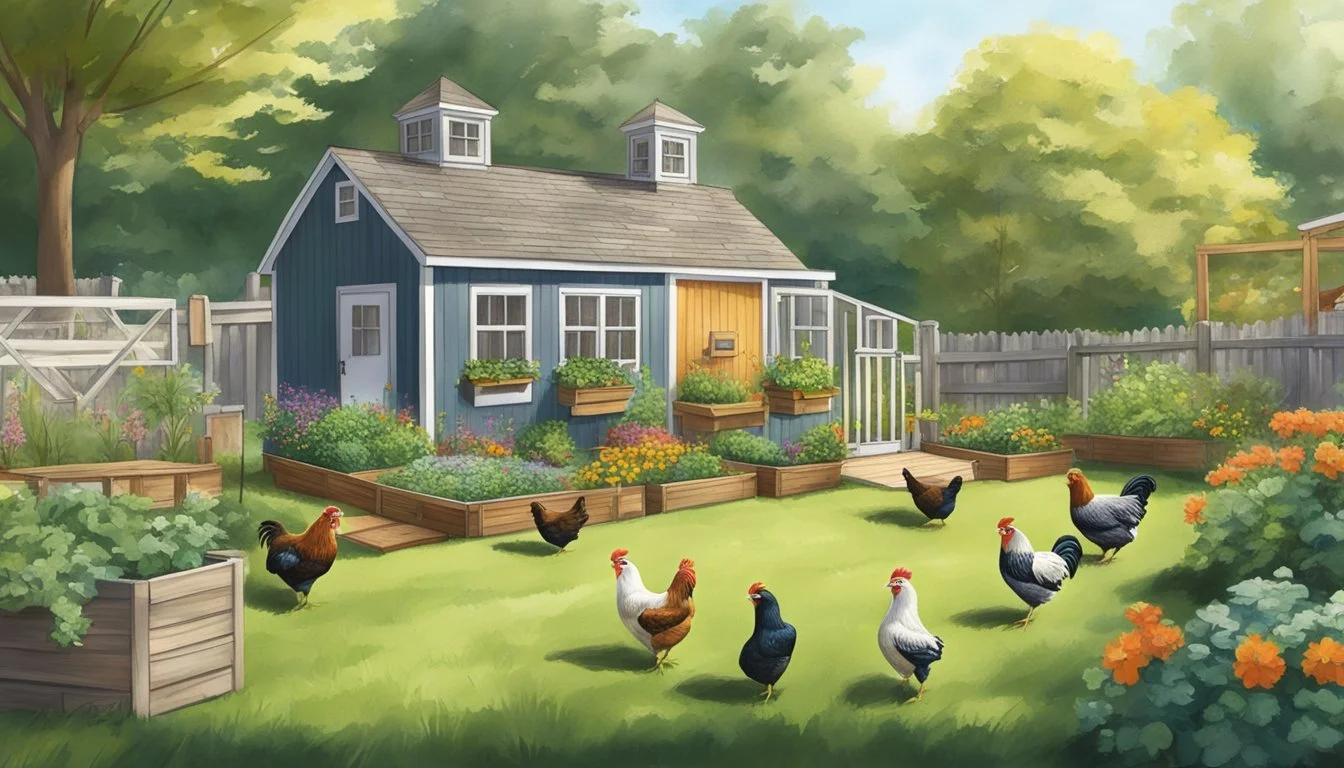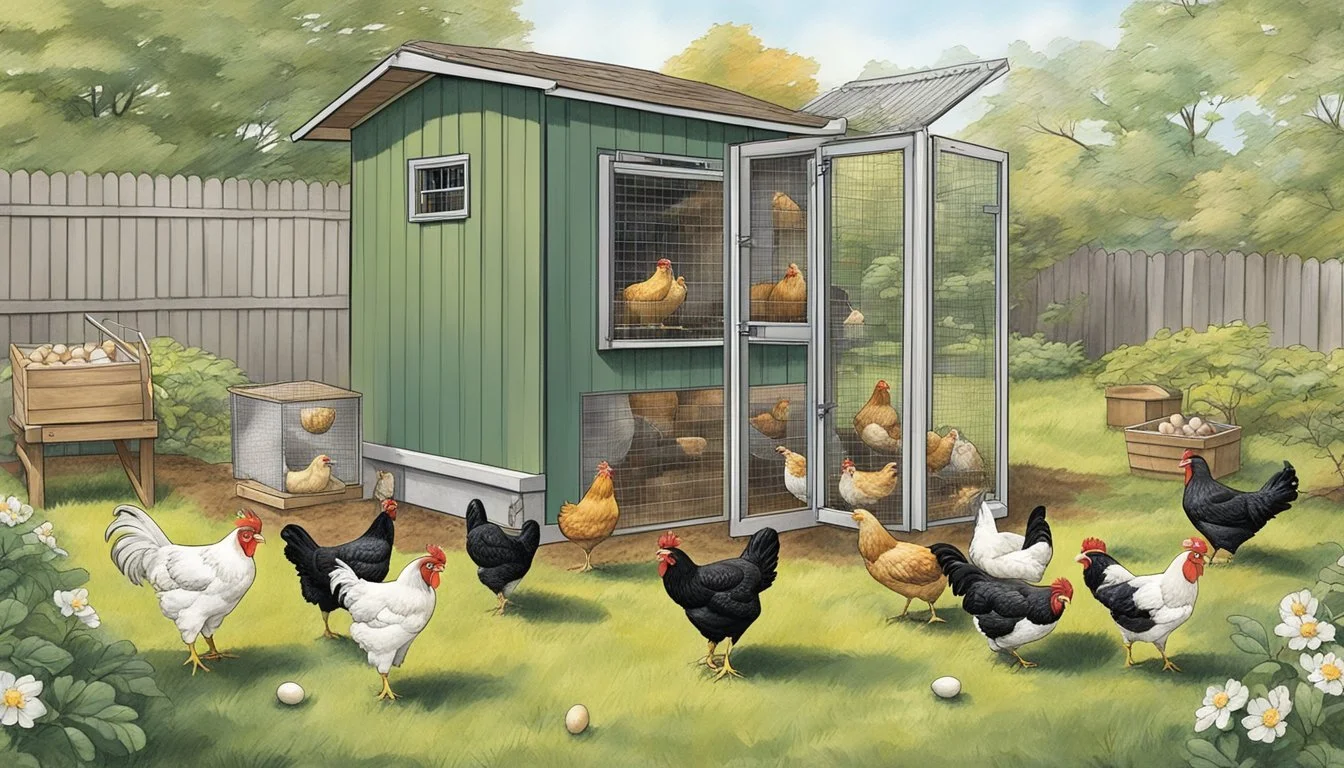Raising Backyard Chickens in Warwick, RI
Essential Tips for Beginners
Raising backyard chickens in Warwick, Rhode Island, offers residents a way to embrace sustainable living with the satisfaction of fresh eggs and the joy of caring for animals. Warwick's prevailing ordinances require property owners who wish to keep livestock, including chickens, to have at least five contiguous acres. Within the city limits, it's crucial for potential chicken owners to understand the local laws to ensure they remain compliant with zoning regulations.
In Warwick, specific provisions allow for the raising of chickens and outline the requirements for coops and enclosures. While the city does not limit the number of chickens a resident can keep, it prohibits the keeping of roosters to avoid noise issues. Chickens must be provided with a proper coop that ensures their safety and hygiene. Residents considering the addition of a chicken coop to their property are encouraged to review local zoning classifications and contact local authorities for any neighborhood-specific restrictions.
As the practice of keeping backyard chickens grows in popularity, Warwick residents must navigate a patchwork of regulations that govern this activity. This includes maintaining appropriate coop conditions, adhering to space guidelines, and staying informed about any updates to local ordinances. The city's approach to backyard chickens balances the benefits of urban agriculture with the need for order and consideration in residential areas.
Understanding Local Regulations
Raising backyard chickens in Warwick, RI requires adherence to specific local regulations. These regulations are established to ensure public safety and community well-being. It is essential for potential and existing chicken owners to be familiar with Warwick Zoning Ordinance, Rhode Island State Laws, and the procedures for Permit and Ordinance Compliance.
Warwick Zoning Ordinance
In Warwick, the Raising of livestock ordinance specifically dictates that the raising of chickens, roosters, goats, and pigs is subject to regulations outlined in Section 204 of Use Table 1 of the City Zoning Ordinance. The following key points are noted in the ordinance:
The raising of these animals is permitted by right within certain zoning districts.
In some districts, this type of livestock raising is prohibited.
A special use permit is required in districts where it is not outright permitted or prohibited.
Rhode Island State Laws
Different from Warwick's specific ordinances, Rhode Island State Laws do not have a unified statewide regulation that directly addresses the keeping of backyard chickens. Instead, chicken ordinances and restrictions are predominantly governed by local municipalities such as Warwick, Cranston, West Warwick, and East Providence. Individuals must review their local zoning classifications and contact local authorities to understand property-specific regulations.
Permit and Ordinance Compliance
When considering raising chickens in Warwick, it is imperative to research and acquire the necessary permits. The process often involves:
Reviewing local ordinances: Changing regulations require keeping up-to-date with the latest information, which can be obtained directly from local officials.
Applying for permits: If applicable, residents must apply for a special use permit to comply with Warwick's zoning ordinance.
Complying with health and safety standards: This may include responsible manure management to prevent soil or water contamination, as highlighted by local resources.
By thoroughly understanding and complying with these regulations, residents can responsibly enjoy the benefits of raising backyard chickens.
Choosing the Right Chicken Breeds
When selecting the right breed of chickens for a backyard flock in Warwick, Rhode Island, a future hobbyist should consider the local climate, egg laying and meat production capabilities, as well as the birds' behavior and temperament.
Climate Considerations
The climate in Warwick, Rhode Island, can vary from cold winters to warm summers. Suitable chicken breeds for this environment include:
Plymouth Rocks: They are well-suited for cold climates and are known for their hardiness.
Australorps: These birds adapt well to a variety of climates and are excellent layers, making them a good choice for Rhode Island's weather.
Chickens must be sheltered from extreme weather, so a coop that protects against winter chills and summer heat is essential.
Egg Laying and Meat Production
Backyard chicken enthusiasts typically prioritize egg production, meat quality, or both:
Rhode Island Reds: Recognized for their high egg-laying capacity with around 200-300 brown eggs per year.
For Egg Production:
Breed Egg Color Annual Yield Australorps Brown Approximately 250 eggs Rhode Island Reds Brown Up to 300 eggs
For Meat Production: Breeds like the Plymouth Rock are considered dual-purpose, offering both a good rate of egg laying and a substantial body size for meat.
Behavior and Temperament
A breed's behavior is crucial for maintaining a harmonious backyard flock:
Australorps are known for their calm and friendly nature.
Plymouth Rocks generally have a docile temperament, making them ideal for families and novice chicken keepers.
Choosing a chicken breed that fits with the keeper's specific needs and lifestyle will lead to a more rewarding experience with backyard chicken raising.
Constructing a Suitable Chicken Coop
When constructing a chicken coop in Warwick, Rhode Island, one must consider the space and size needs of the chickens, ensure protection against predators, and include appropriate amenities for a healthy and productive flock.
Size and Space Requirements
The size of the chicken coop must accommodate the number of chickens one plans to keep. Each chicken requires:
2-3 square feet inside the coop
8-10 square feet in an outdoor run
Table: Space Specifications per Bird
Chicken Count Indoor Space (sq ft) Outdoor Run (sq ft) 5 10-15 40-50 10 20-30 80-100 15 30-45 120-150
Protection from Predators
A critical aspect of coop design is safeguarding against predators. Key protective features should include:
Sturdy Construction: Use solid materials without gaps.
Wire Mesh: Bury it around the coop's perimeter to deter digging.
Locks: Secure doors with predator-proof latches.
Coop Amenities
Chickens require specific amenities in their coop for laying, comfort, and health:
Nesting Boxes: Allocate one box per 4-5 hens, measuring at least 12x12x12 inches.
Ventilation: Install adjustable vents to manage airflow and reduce moisture.
Roosts: Provide roosting space at least 2 feet off the ground and 8 inches per bird.
Cleaning: Include a removable tray or easy-access doors for regular cleaning.
Automatic Coop Doors: Install them for regulating access to the outdoor run.
Lighting and Heating: Incorporate coop lighting for extended laying periods and coop heating for winter months, ensuring temperature doesn't drop below freezing.
Day-To-Day Chicken Care
Proper day-to-day care for backyard chickens in Warwick, RI, involves a strategic approach to feeding, hygiene, and health maintenance to ensure a thriving coop and a steady supply of fresh eggs.
Feeding and Nutrition
Chickens require a balanced diet that includes a variety of nutrients. Complete chicken feed is available that provides the necessary vitamins and minerals. Layer feed typically contains about 16% protein and is suitable for egg-laying hens.
Regular Feeding: Introduce feed twice a day to maintain a routine.
Supplements: Offer calcium supplements like oyster shell for stronger eggshells.
Grit: Provide grit to help with digestion, which they cannot produce naturally.
Water Supply and Hygiene
Hydration and cleanliness are crucial for chickens' health and productivity.
Fresh Water: Refresh water daily to prevent the spread of disease.
Waterers: Use chicken waterers that are easy to clean to maintain water hygiene.
Manure Management: Remove manure from the coop regularly to keep the living area clean and reduce the risk of disease.
Health and Wellness Maintenance
Observing the chickens daily is essential for early detection of health issues.
Shade and Shelter: Ensure adequate shade in the coop to protect chickens from extreme weather.
Space: Provide sufficient space to roam and forage as it's integral for their wellness.
Egg Collection: Collect eggs daily to keep them clean and to discourage brooding or egg-eating.
By adhering to these practices, backyard chicken keepers in Warwick can maintain a healthy and productive flock.
Managing Coop Environment
Proper coop management is crucial for healthy chickens and a pleasant backyard experience. Key areas include maintaining cleanliness, ensuring adequate ventilation, and safeguarding against rodents and pests.
Cleaning and Odor Control
Regular cleaning of the chicken coop is essential to control odor and maintain a healthy environment. Manure should be removed frequently— ideally daily to prevent the accumulation of waste and associated smells. Spent bedding must be replaced with fresh material to minimize odor. Using natural coop deodorizers, such as lime or baking soda, can neutralize smells without harming the chickens.
Daily Tasks:
Remove droppings from nesting boxes and roosting areas.
Spot clean any wet or soiled bedding.
Weekly Tasks:
Change out bedding as needed.
Use coop deodorizers in particularly smelly areas.
Ventilation and Temperature
Appropriate ventilation is necessary to provide fresh air and regulate temperature within the coop. Coops should have vents or windows that allow for air movement but are designed to prevent drafts directly on the birds, especially during colder months. During hot weather, adequate airflow is vital to prevent overheating.
Ventilation Tips:
Install vents or windows high in the coop to allow hot air to escape.
Ensure openings are covered with predator-proof wire mesh.
Protection Against Rodents and Pests
A secure coop design helps protect chickens from rodents and pests that pose a threat to their safety and health. Solid construction with no gaps prevents entry points for mice and rats. Additionally, regular inspection for signs of wear and any gaps, coupled with immediate repairs, can keep pests at bay. Use hardware cloth instead of chicken wire for added security, as it is more robust and effective at deterring pests.
Preventative Measures:
Seal all gaps and reinforce any weak points in the coop structure.
Store feed in rodent-proof containers to avoid attracting pests.
Chicken Coop Innovations
In the pursuit of improving backyard chicken keeping, technology has introduced various innovative solutions to enhance the care and maintenance of chicken coops. These innovations contribute to the safety, health, and well-being of the chickens, as well as provide convenience to the owners.
Automatic Doors and Lighting
Automatic coop doors provide security by allowing chickens to safely enter and exit the coop at predetermined times, thus protecting them from predators. They are usually equipped with sensors that trigger the doors to open at sunrise and close at sunset. Alongside, coop lighting has advanced to support the birds' health and egg production, with lights that can mimic natural sunlight patterns and operate on timers or light sensors.
Coop Monitoring Systems
Coop monitoring systems have become a vital component for the vigilant poultry keeper. These systems encompass coop cameras, which allow owners to observe their flock remotely. Such surveillance ensures quick responses to any unusual activity. Additionally, environment sensors can alert owners to changes in temperature or humidity that may affect the flock's environment.
Entertainment for Chickens
Chickens benefit from stimulation to prevent boredom and discourage negative behaviors, like pecking at each other. Owners can now use toys for chickens, such as treat balls or pecking toys, to keep their flocks engaged. These items promote natural foraging behavior and may help reduce the need for anti-pecking spray, which is sometimes used to stop chickens from pecking at one another.
Handling and Processing Products
When raising backyard chickens in Warwick, RI, it is essential to consider proper methods for handling and processing products such as fresh eggs, manure, and meat. Understanding these procedures ensures not only the health and safety of consumers but also compliance with local regulations.
Collecting and Using Fresh Eggs
Individuals should collect eggs at least once a day to ensure freshness and prevent breakage. Fresh eggs can be stored at room temperature for several weeks, yet refrigeration extends their shelf life. A simple date-labelling system:
Collected Date: Should be marked on the egg or carton.
Storage Tips: Keep eggs in a consistent, cool environment away from strong-smelling foods.
As local ordinances may vary, one should verify whether selling eggs requires specific packaging or labeling.
Composting Manure
Chicken manure is a valuable byproduct that can be transformed into compost for use as a natural fertilizer. Here’s the process in brief:
Step 1: Collect manure and bedding regularly from the chicken coop.
Step 2: Combine with carbon-rich materials, like dry leaves or straw, maintaining a balanced carbon-to-nitrogen ratio.
Step 3: Turn the compost pile periodically to aerate and facilitate decomposition.
One must ensure that the compost reaches a temperature high enough to destroy pathogens before applying it to gardens.
Preparing Chickens for Consumption
When the time comes to prepare chickens for consumption, certain tools and steps are necessary for hygiene and efficiency. A chicken plucker can significantly speed up the feather removal process, and care should be taken to follow these steps:
Slaughtering: Must be carried out humanely and abide by any local regulations.
Scalding: Dipping the chicken in hot water loosens feathers.
Plucking: Using a chicken plucker can save time and ensure thorough removal.
Evisceration: Carefully remove the entrails, taking care not to rupture the intestines to avoid contamination.
Chilling: Chill the carcass immediately after processing to prevent bacterial growth.
Following these steps ensures that the chicken meat is safe and ready for cooking or freezing.
Community and Legal Considerations
Raising backyard chickens in Warwick, Rhode Island is a subject enveloped by local regulations and community relationships. Residents interested in keeping chickens should be well-informed of the legal framework while fostering positive interactions with neighbors and the community.
Neighbor Relations
When a resident decides to raise backyard chickens, it's crucial they communicate with their neighbors. This dialogue can preempt concerns related to noise, odors, or potential property damage. The Providence Journal suggests that building a positive community rapport can also be instrumental when regulatory changes are considered by local authorities.
Property Line and Residential Issues
In Warwick, the owner must reside on the property, which should constitute a minimum of five contiguous acres, to legally raise and keep chickens. It's essential for residents to understand zoning classifications and comply with Section 204 from the City of Warwick Zoning Ordinance to avoid violations.
Property Requirements: Minimum of five contiguous acres
Legal Reference: City of Warwick Zoning Ordinance, Section 204
Supporting Local Chicken Enthusiasts
Communities thrive when members share common interests. Local chicken enthusiasts can seek guidance and share knowledge through platforms like ChickenLaws.com. Additionally, they might network through agricultural groups or attend city council meetings to stay abreast of any legislative updates that could impact their hobby.
Local Resources: ChickenLaws.com
Community Engagement: Agricultural groups, city council meetings
Life Cycle of Backyard Chickens
The life cycle of backyard chickens in Warwick, Rhode Island encompasses several critical stages, from the delicate incubation period to the robust pullet phase, and finally the natural aging process.
Incubating and Hatching Eggs
In Warwick, individuals embarking on the journey of incubating eggs should maintain a controlled environment for 21 days, ensuring temperature and humidity are optimal for successful hatching. The temperature should be kept at 99.5°F (37.5°C) with a humidity level of roughly 50-65%, which rises to 65-75% just before hatching.
Raising Chicks to Pullets
After hatching, chicks require a brooder with consistent heat, initially set at 95°F and decreasing by 5°F each week until they are acclimated to the outdoor temperature. A nutritious starter feed containing at least 18% protein is essential. They transition from chicks to pullets, juvenile hens, at about 6 weeks old. This marks the growth phase where their care will influence their future laying ability.
The Aging Process of Chickens
Chickens generally reach full maturity at 18-24 weeks, when hens begin to lay eggs. Their egg-laying peak occurs around 1-2 years of age, after which production gradually declines. Proper nutrition and care can extend a hen's productive lifespan, and even as egg-laying diminishes, they remain integral members of the backyard flock.
Supplementary Resources and Information
For residents of Warwick, Rhode Island, embarking on the journey of raising backyard chickens, there are various resources that provide valuable information and support. These resources can help novices and experienced chicken keepers alike to ensure their flocks thrive.
Educational Workshops
Warwick residents can enrich their knowledge through educational workshops tailored to poultry care. Local agricultural extensions often host events and workshops covering topics from basic care to advanced poultry health. Keep an eye on community boards or city websites such as Warwick's official page for upcoming workshop announcements.
Online Communities
Joining online communities can provide Warwick's chicken enthusiasts with a platform to share experiences and advice. Dedicated websites, forums, or social media groups specific to chicken raising in Rhode Island cities like Providence, Newport, or East Providence can be particularly informative. A platform such as ChickenLaws.com also provides updates and insights relevant to local regulations and best practices.
Local Poultry Associations
Engaging with local poultry associations in and around Warwick, including those in Coventry, Bristol, Warren, Scituate, South Kingstown, Cumberland, and nearby localities, can be beneficial. Associations often advocate for poultry keepers, provide educational resources, and create opportunities for networking. They are often a reliable source of information on breed-specific advice and can assist with understanding local ordinances relating to chicken keeping.
By tapping into these resources, Warwick residents can gain the support and information needed to successfully raise backyard chickens in compliance with local regulations.












